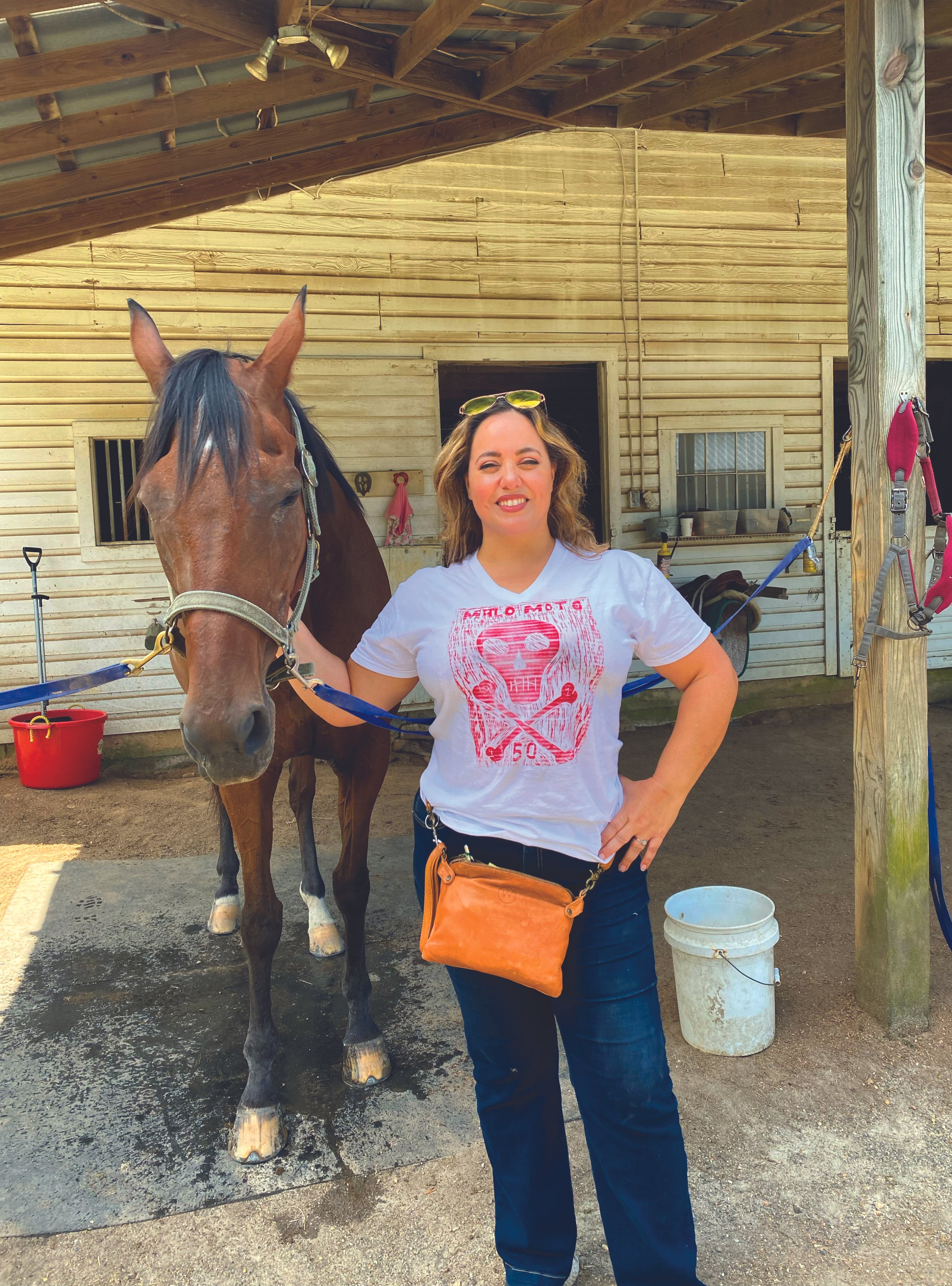Fayeruz Regan with Tango the horse, at A New Day Equine Therapy in Ashland.
Horses and Healing A Journey Toward Wellness
by Fayeruz Regan 09.2024
Let’s face it – the world is on fire. When people ask how I’m doing, I pause for a millisecond while weighing the authenticity of that question, and my relationship to the inquirer. In most cases, I put aside the trauma I’m experiencing as a Palestinian (and an American, for that matter), and for the sake of the conversation reply, “Fine.”
I may not know the meaning of life, but I know what I want to do with it. I want to have fun and be happy. Sound trivial? Try it. I knew that equine therapy had been growing in popularity, so I spent an afternoon at New Day Equine Therapy in Ashland. Even the drive was something out of a dream. In downtown Ashland, a folk band played in a grassy square as people enjoyed ice cream. This gave way to a street lined with Victorian homes, which then transformed into a bucolic paradise – old red barns, grazing sheep, and butterflies everywhere.
As I pulled up, dust was kicked up in a training ring as a young girl sat atop a trotting thoroughbred. Owner Bruce Nachman started New Day to heal those who were struggling. In the beginning, the focus was on those whose lives had been upended by cancer, from patients to survivors to family members. Bruce himself had lost a loved one to cancer ten years ago, and when someone asked him what they could do to help, he really thought about it and recalled his love for horses.
The native Ohioan had been riding since he was six years-old. He progressed into an athlete, with hunter and jumper style-riding. In response to his grief, he began to ride again. When he caught wind about people riding or dressing horses as therapy, he wanted to start a nonprofit.
He is now a PATH (Professional Association of Therapeutic Horsemanship)-certified instructor, and his services extend beyond cancer patients and their families. He services those on the spectrum, people who have suffered brain traumas, and those experiencing mental health issues, such as anxiety and depression.
Volunteers Trudy and Bobbie walked me out to the stables, where large brown eyes studied me curiously. Horses have an excellent sense of hearing and can detect your heartbeat from over four feet away. In the wild they synchronize their heartbeats for safety. If someone’s heartbeat is out of sync, it can indicate to the herd that danger is imminent. As larger mammals, their hearts beat a little slower. They try to align with human heartbeats, which results in us lowering our heartbeat to better match their frequency, naturally reducing stress.
Because they’re pack animals, horses look out for one another. They tap into human energy too. A couple of them approached me, lowering their heads so we could make eye contact. Some closed their eyes as I scratched their muzzle, others nibbled playfully at my clothes. I brushed my horse and went into a zone. It was peaceful. Soon after, I wandered under the shade of a tree to watch a session.
Bruce gave precise riding commands, no coddling. These riders were getting a real lesson, and not being spared because of their suffering. It was in that moment I realized this therapy helps by building confidence, which is Bruce’s job. The serenity and peace of mind comes directly from the connection to their horse. Parents lean against the fence to watch, and they’re gleaming.
We settled into Bruce’s office, which was 1970’s Wyoming in the best way possible. Wood-paneled walls, low ceiling, dusty saddles hanging, an ashtray. Bruce was rangy and had an Australian-like ruggedness. “Some of the most meaningful sessions are those with cancer survivors. It’s magical to watch. Riding gives them purpose, confidence, plus they’re learning a new skill,” he said. “Still, there needs to be more awareness about the value of therapeutic horseback riding.” I could not agree more.
For anyone out there struggling, a little horsing around couldn’t hurt. Equine therapy extends beyond riding. People find serenity just grooming or caring for a horse, spending time with them outside in nature.
For those who feel joy just being near them, you can stay at The Collette House in the Outer Banks, only 2.5 hours away. This Airbnb destination is an impeccably-converted barn sitting above horse stables. Throughout your stay you are welcome to pet them, feed them, and enjoy watching their newborn kick around playfully from your bedroom window.
That’s happening at this very moment, as I type this.

